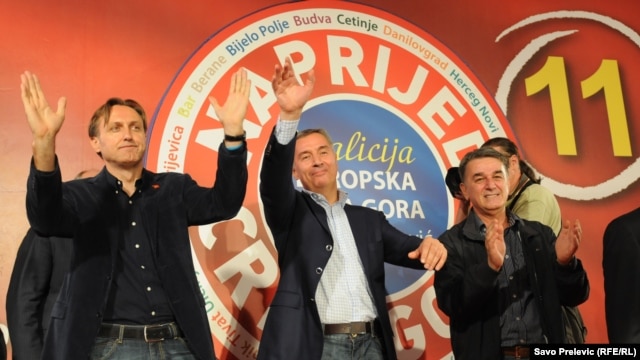OSCE cautiously praises Montenegrin elections
| Publisher | Radio Free Europe/Radio Liberty |
| Publication Date | 15 October 2012 |
| Cite as | Radio Free Europe/Radio Liberty, OSCE cautiously praises Montenegrin elections, 15 October 2012, available at: https://www.refworld.org/docid/5089072dc.html [accessed 2 June 2023] |
| Disclaimer | This is not a UNHCR publication. UNHCR is not responsible for, nor does it necessarily endorse, its content. Any views expressed are solely those of the author or publisher and do not necessarily reflect those of UNHCR, the United Nations or its Member States. |
Last updated (GMT/UTC): 15.10.2012 11:44
By RFE/RL
 Veteran Montenegrin leader Milo Djukanovic (center) celebrates the win by his Coalition for European Montenegro.
Veteran Montenegrin leader Milo Djukanovic (center) celebrates the win by his Coalition for European Montenegro.
The Organization for Security and Cooperation in Europe (OSCE) has praised the October 14 Montenegro elections as "pluralistic with respect for fundamental rights."
However, the OSCE statement said that "the abuse of administrative resources and a lack of transparency in campaign and political party financing are a matter of concern."
With nearly all of the votes counted, the alliance of Milo Djukanovic's Democratic Party of Socialists (DPS) and two smaller parties look set to get 39 seats in the 81-seat parliament – not enough to secure an absolute parliament majority.
The coalition is expected to seek the support of parliamentary minority groups to form a new government.
Voter turnout was some 70 percent.
The ruling coalition's victory was smaller than in the last elections, in 2009, when it won enough votes to secure an outright majority in parliament.
The coalition's victory opens up the possible return to the prime minister's office of Milo Djukanovic, who has served as Montenegro's president or prime minister for most of the past two decades.
Djukanovic favors the tiny Balkans state's membership in the European Union and NATO. Montenegro opened accession talks with the EU this year.
"Dear friends, as we have promised, we have won. Montenegro is going forward," Djukanovic told a victory celebration in Podgorica.
"We have all the conditions to, as of tomorrow, work on the creation of the government, which will continue to successfully lead Montenegro along the path of European and Euro-Atlantic integration and to be absolutely devoted to our basic program priority, and that is improvement of the quality of living for every citizen of Montenegro."
Djukanovic did not indicate whether he will, in fact, pursue the prime minister's post. He stepped down as prime minister in 2010 as his handpicked successor Igor Luksic took over.
Djukanovic is credited with helping guide the mountainous territory of less than 700,000 people to independence from Serbia in 2006. He was also in charge when Montenegrin became the country's official language.
His leadership and group, however, have faced criticism over allegations of high-level corruption and for failing to keep the country out of an economic downturn.
The Montenegrin economy flourished after the country left Serbia, thanks in part to robust tourism and investment on the scenic Adriatic coast.
But the economy has recently been dragged down, in part by the eurozone debt crisis, and unemployment in the country is now above 10 percent.
Analysts say Montenegro will have to show progress in strengthening the rule of law and battling corruption to make strides in its EU accession negotiations.
With reporting by Reuters, AP, and RFE/RL's Balkan Service
Link to original story on RFE/RL website
